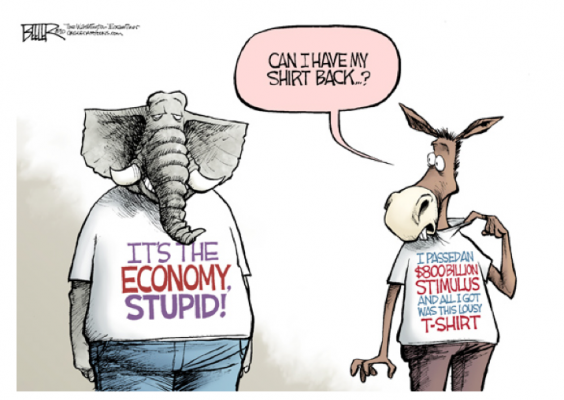Will it Still Be The Economy, Stupid, in 2020?
Co-sponsored by Social Science Matrix and the Jack Citrin Center for Public Opinion Research
Matrix is located on the 8th floor of Barrows Hall, on the UC Berkeley campus, near Telegraph and Bancroft Avenues, just up the hill from Sather Gate. There are entrances at both ends of the building, but only one of the elevators on the eastern side goes directly to the 8th floor. You can alternatively take the stairs to the 7th floor and walk up the stairs.

Please join us for an engaging panel discussion featuring four distinguished political scientists focused on the role of the economy in the 2020 elections. This event is co-sponsored by Social Science Matrix and the Jack Citrin Center for Public Opinion Research. Seating is limited.
Please register at https://citrin2020economy.eventbrite.com.
Speakers
James Campbell, UB Distinguished Professor of Political Science at SUNY Buffalo
James E. Campbell is a UB Distinguished Professor of political science at the University at Buffalo. He is the author of four university press books and more than 80 journal articles and book chapters. His most recent book is Polarized: Making Sense of a Divided America (Princeton University Press). His other books include The American Campaign: U.S. Presidential Campaigns and the National Vote (Texas A&M, 2000 and 2008), Cheap Seats: The Democratic Party’s Advantage in U.S. House Elections (Ohio State, 1996), and The Presidential Pulse of Congressional Elections (Kentucky, 1993 and 1997). He also co-edited Before the Vote and edited thirteen journal symposia on election forecasting. He has served as Chair of the Political Forecasting Group (APSA), as President of Pi Sigma Alpha (the national political science honor society), as a Congressional Fellow of the American Political Science Association, and as a program director of the Political Science Program at the National Science Foundation. He has been a member of six editorial boards of political science journals and seven executive councils of political science organizations. Prior to joining the UB faculty in 1998, he was on the faculties of the University of Georgia from 1980 to 1988 and Louisiana State University from 1988 to 1998. He was Chair of UB’s Department of Political Science from 2006 to 2012.
Douglas Rivers, Professor of Political Science, Stanford University; Chief Scientist, yougov
Doug Rivers is one of the world’s leading experts on survey research and a successful Silicon Valley entrepreneur. He has taught at Harvard University, Caltech, UCLA, and, most recently, Stanford University, where he is Professor of Political Science and Senior Fellow at the Hoover Institution. Doug has founded two successful technology companies, Preview Systems and Knowledge Networks. Preview Systems pioneered the field of digital rights management, conducted a successful IPO in 1999, and was sold in 2001. As CEO of the company, he was named Executive of the Year (2000) by Research Business Report and received the Innovator's Award by the American Association of Public Opinion Research (2001). He is also a CBS News consultant and has published academic papers in numerous journals including the American Political Science Review, American Journal of Political Science, and the American Economics Review, to name a few. He holds a B.A. from Columbia University and a Ph.D. from Harvard University.
Lynn Vavreck, Marvin Hoffenberg Chair in American Politics and Public Policy, UCLA
Lynn Vavreck is the Marvin Hoffenberg Professor of American Politics and Public Policy at UCLA, a contributing columnist to The Upshot at The New York Times, and a recipient of the Andrew F. Carnegie Prize in the Humanities and Social Sciences. She is the author of five books, including the “most ominous” book on the 2016 election: Identity Crisis: The 2016 Presidential Campaign and the Battle for the Meaning of America, and The Gamble: Choice and Chance in the 2012 Presidential Election, described as the “definitive account” of the 2012 election. Political consultants on both sides of the aisle refer to her work on political messaging in The Message Matters as “required reading” for presidential candidates. Her research has been supported by the National Science Foundation and she has served on the advisory boards of both the British and American National Election Studies. At UCLA, she teaches courses on campaigns, elections, public opinion, and the 1960s. Professor Vavreck holds a Ph.D. in political science from the University of Rochester and held previous appointments at Princeton University, Dartmouth College, and The White House. A native of Cleveland, Ohio, she remains a loyal Browns fan and is a “known equestrian," to draw on a phrase from the 2012 presidential campaign.
Gabriel Lenz, Professor of Political Science, UC Berkeley
Gabriel Lenz's research focuses on voters’ ability to control their elected officials. His aim is to further our understanding of when voters succeed in holding politicians accountable, when they fail, and how to help them avoid failures. He has published a book, Follow the Leader? How Voters Respond to Politicians' Performance and Policies, with the University of Chicago Press, and his articles have appeared the American Journal of Political Science, American Political Science Review, Political Analysis, Political Behavior, and Political Psychology. His work draws on insights from social psychology and economics, and his research and teaching interests are in the areas of elections, public opinion, political psychology, and political economy. Although specializing in American democracy, he also conducts research on Canada, UK, Mexico, Netherlands, and Brazil. He has ongoing projects about improving voters' assessments of the performance of politicians, reducing the role of candidate appearance in elections, and measuring political corruption.



